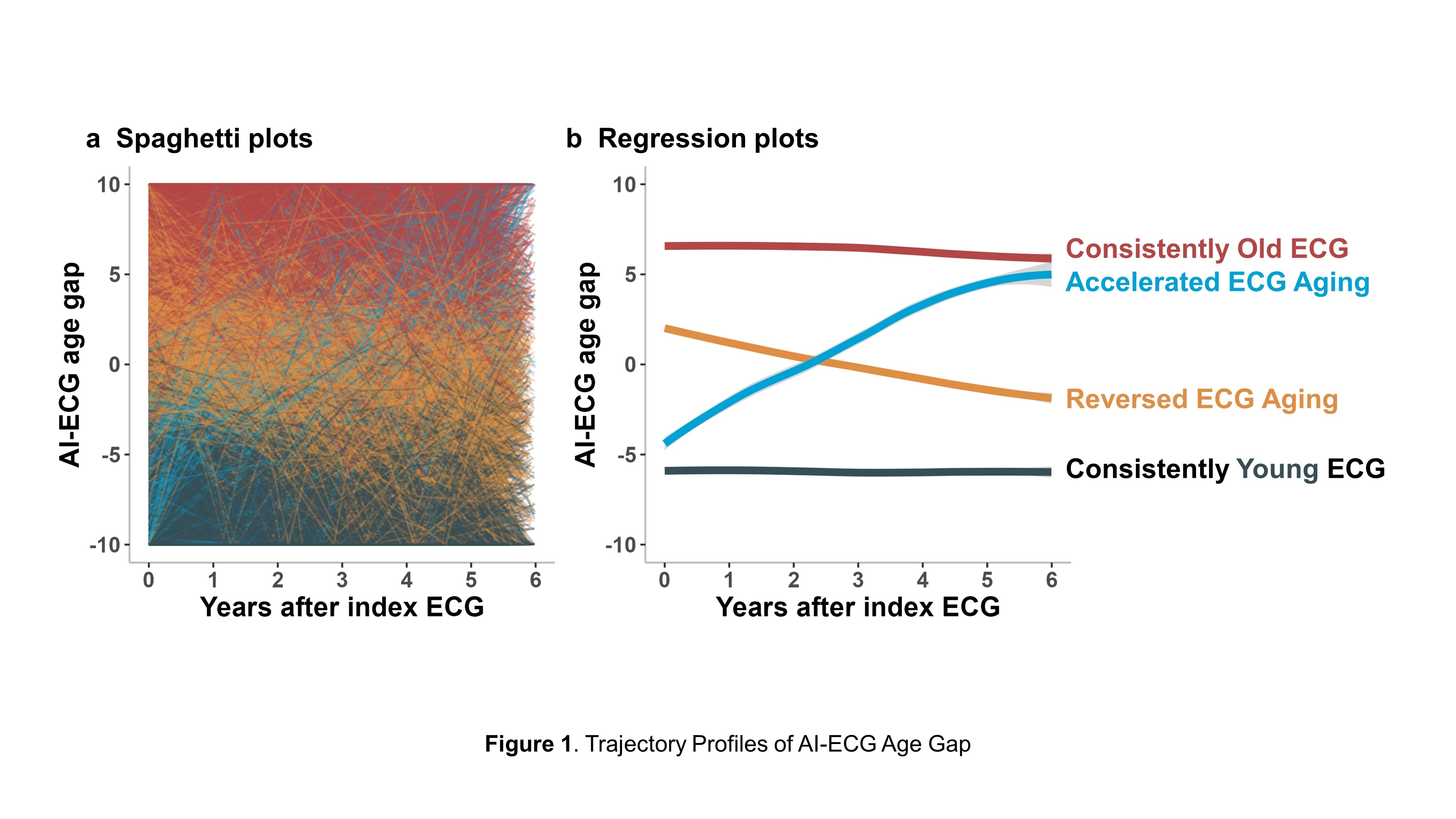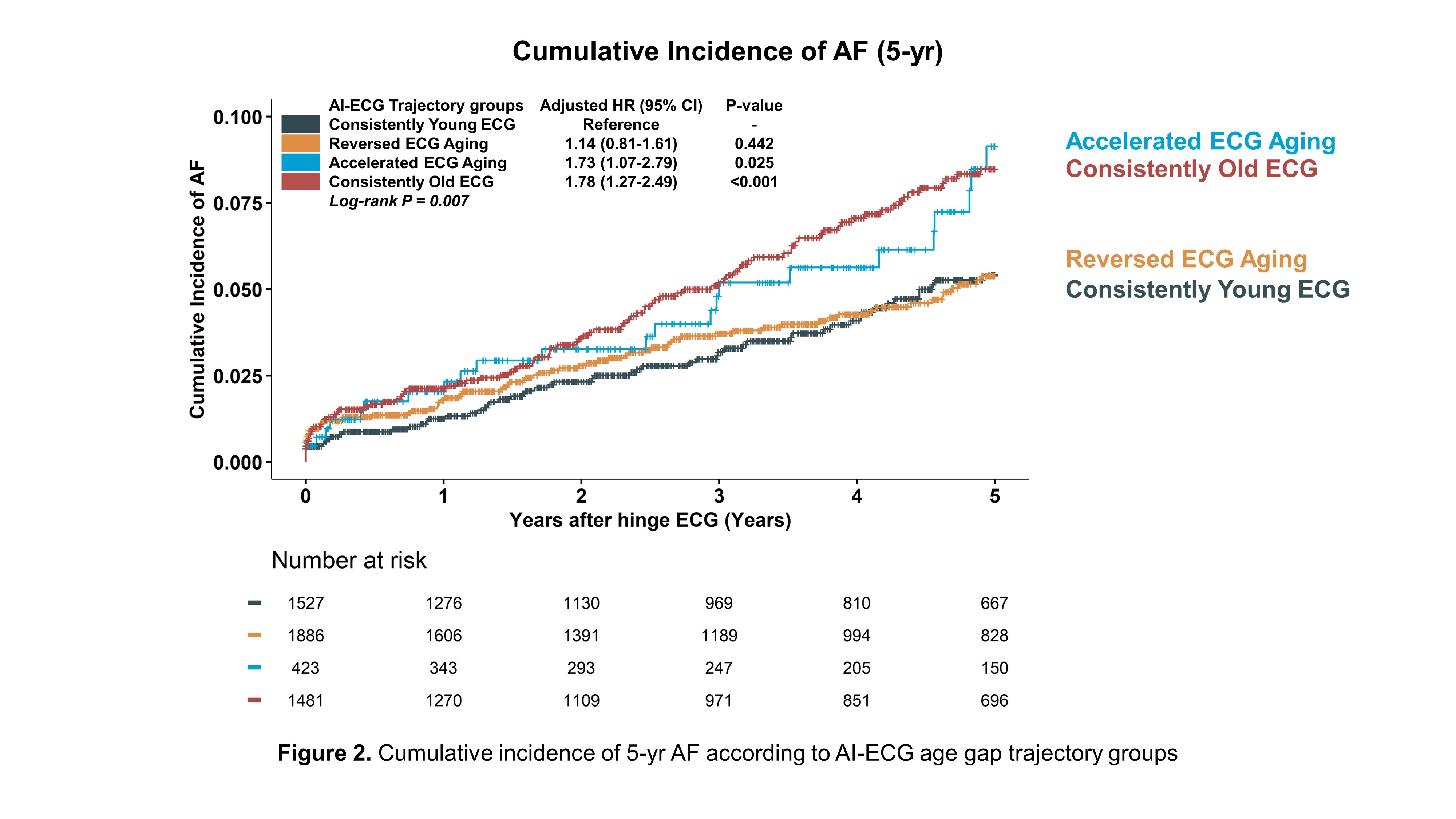Final ID: Mo3076
Artificial Intelligence-Enhanced Electrocardiogram Trajectories for Age Estimation: Prognostic Assessment and Differential Prediction of Atrial Fibrillation Occurrence
Abstract Body (Do not enter title and authors here): Background: The use of Artificial Intelligence (AI) to estimate age from 12-lead electrocardiogram (ECG) data has shown promise as a biomarker for predicting future cardiac disease risk. However, the long-term outcomes based on the temporal variations in the AI-ECG age gap remain uncertain.
Hypothesis: This study aims to longitudinally track the differences between AI-predicted age and actual chronological age using ECG data and evaluate whether significant clinical differences in atrial fibrillation (AF) occurrence exist among various patient groups.
Methods: From a single-center cohort not previously used for AI-ECG age prediction (121,702 individuals, 522,261 ECGs), 5,317 individuals with 24,368 ECGs who had an initial ECG and a follow-up ECG in the fifth year, along with at least one intervening ECG, were included for analysis. The absolute age gap, defined as the absolute difference between ECG-predicted and chronological age, was constrained to ±10 years for this analysis. Latent class trajectory modeling was employed to categorize groups based on the AI-ECG age gap trajectories.
Results: The analysis identified four distinct trajectory groups based on age gap patterns: Consistently Young ECG (28.7%), Reversed ECG Aging (35.5%), Accelerated ECG Aging (8.0%), and Consistently Old ECG (27.9%). Both the Accelerated ECG Aging group (adjusted hazard ratio (HR) 1.73, 95% confidence interval (CI) 1.07-2.79, p-value = 0.025) and the Consistently Old ECG group (adjusted HR 1.78, 95% CI 1.27-2.49, p-value < 0.001) had a significantly higher cumulative incidence of AF compared to the Consistently Young ECG group. Four independent predictors of these trajectories were identified: baseline age, chronic kidney disease, diabetes mellitus, and hypertension.
Conclusion: The study identified four distinct AI-ECG age gap trajectory groups, with the Accelerated ECG Aging and Consistently Old ECG groups showing a significantly increased risk of AF occurrence.
Hypothesis: This study aims to longitudinally track the differences between AI-predicted age and actual chronological age using ECG data and evaluate whether significant clinical differences in atrial fibrillation (AF) occurrence exist among various patient groups.
Methods: From a single-center cohort not previously used for AI-ECG age prediction (121,702 individuals, 522,261 ECGs), 5,317 individuals with 24,368 ECGs who had an initial ECG and a follow-up ECG in the fifth year, along with at least one intervening ECG, were included for analysis. The absolute age gap, defined as the absolute difference between ECG-predicted and chronological age, was constrained to ±10 years for this analysis. Latent class trajectory modeling was employed to categorize groups based on the AI-ECG age gap trajectories.
Results: The analysis identified four distinct trajectory groups based on age gap patterns: Consistently Young ECG (28.7%), Reversed ECG Aging (35.5%), Accelerated ECG Aging (8.0%), and Consistently Old ECG (27.9%). Both the Accelerated ECG Aging group (adjusted hazard ratio (HR) 1.73, 95% confidence interval (CI) 1.07-2.79, p-value = 0.025) and the Consistently Old ECG group (adjusted HR 1.78, 95% CI 1.27-2.49, p-value < 0.001) had a significantly higher cumulative incidence of AF compared to the Consistently Young ECG group. Four independent predictors of these trajectories were identified: baseline age, chronic kidney disease, diabetes mellitus, and hypertension.
Conclusion: The study identified four distinct AI-ECG age gap trajectory groups, with the Accelerated ECG Aging and Consistently Old ECG groups showing a significantly increased risk of AF occurrence.
More abstracts on this topic:
ACS-Specific Gut Microbial and Metabolic Profiles Reveal Diagnostic and Recovery Markers
Xu Jing, Fu Jingyuan, Dai Die, Yang Yanan, Yang Jingang, Gao Shanshan, Wu Chongming, He Jiumin, Chen Weihua, Yang Yue-jin
Accelerated Biological Aging, Early-Life Exposure to Tobacco, and Incident Aortic Aneurysm: A Large-Scale Prospective Cohort Study in UK BiobankYang Miaomiao, Feng Weijing, Dang Aimin, Gu Yingzhen


